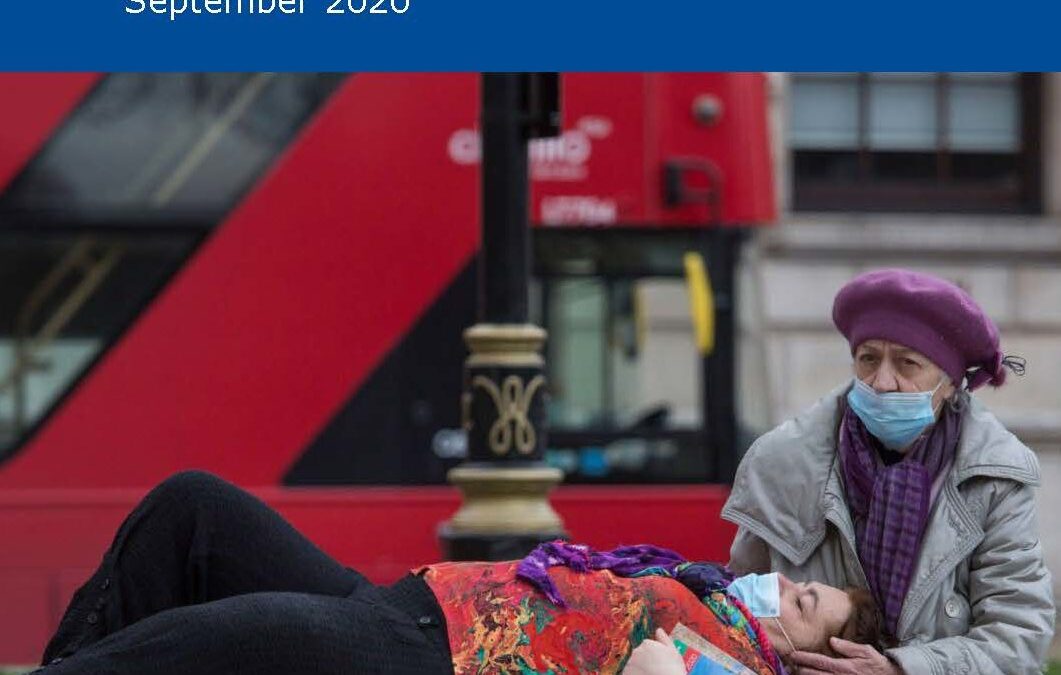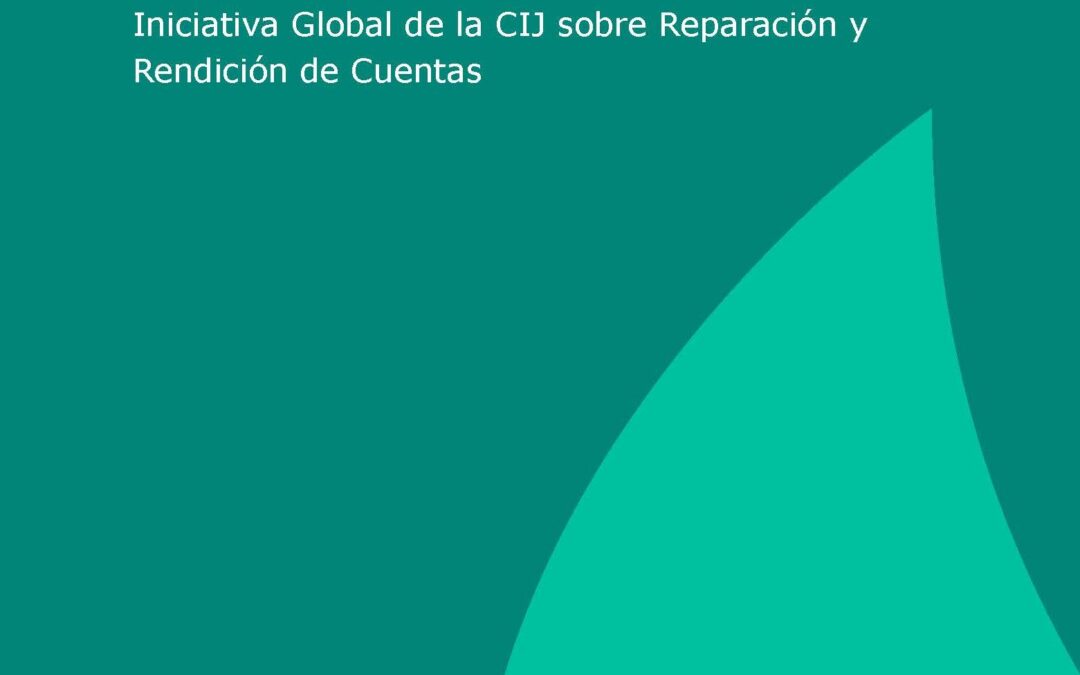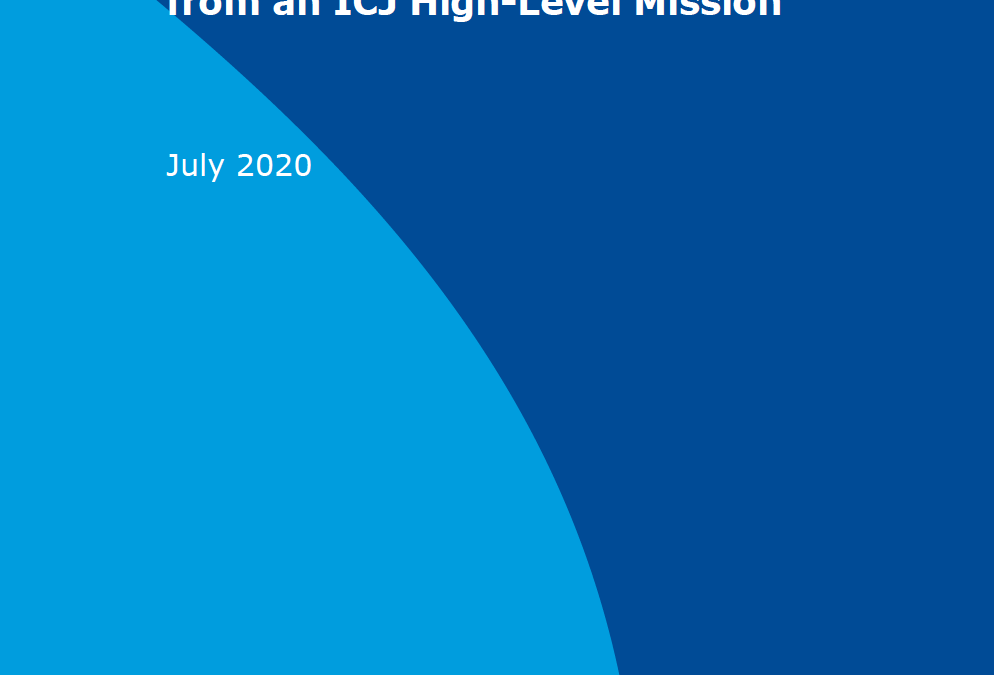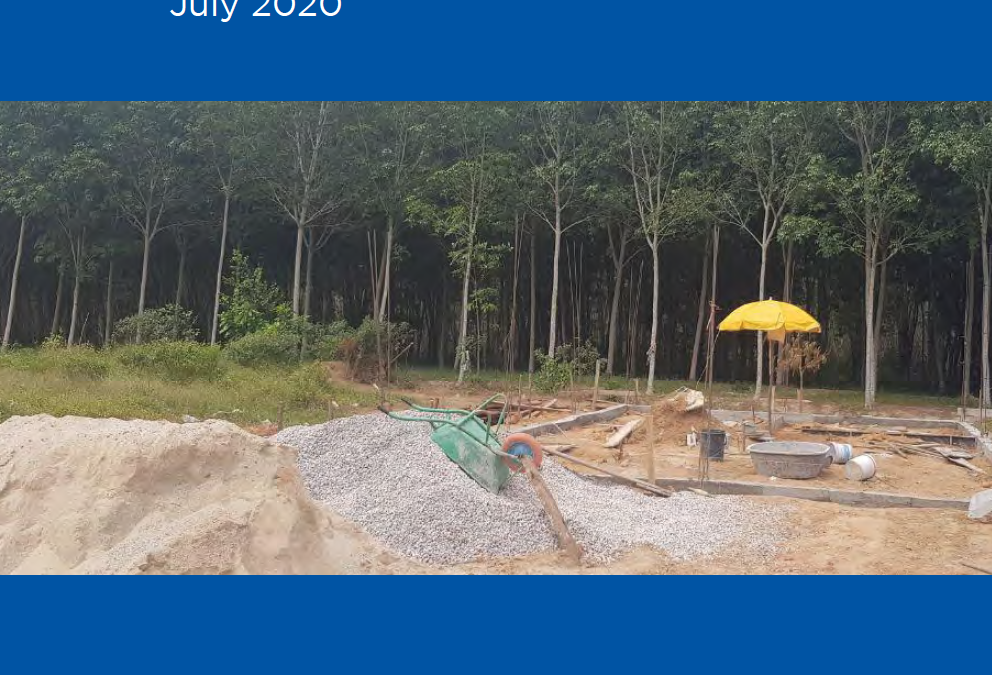
Oct 30, 2020
The ICJ published today its new Guidance on Extraditions and Expulsion in Central Asia, an essential tool for judges, prosecutors, law enforcement officers, lawyers and NGOs in the region to implement these procedures in full respect of international law.
The Guidance is the fruit of the long-term work of the ICJ to bring proceedings for the transfer of suspects in Central Asian countries, in particular extraditions and expulsions, in line with States’ obligations under international law, including international human rights and refugee law. It addresses the application by judges and prosecutors of international law and standards in extradition and expulsion proceedings.
This Guidance has been informed by a comparative legal study conducted by the ICJ on the practices of national security-based transfers in countries of the Commonwealth of the Independent States, the European Union and the United States of America. In this study, the ICJ identified shortcomings and provided recommendations to all the countries examined.
Following this mapping, the ICJ, together with the UN Office on Drugs and Crimes (UNODC), the Regional Office for Central Asia of the Office of the UN High Commissioner for Human Rights (OHCHR), the General Prosecutor’s Office of the Republic of Uzbekistan and the Constitutional Chamber of the Supreme Court of Kyrgyzstan convened two Central Asia international expert workshops for judges and prosecutors from Kazakhstan, Kyrgyzstan, Tajikistan, Turkmenistan and Uzbekistan, with the participation of international experts from several European countries.
This Guidance provides practical recommendations for judges and prosecutors in the region to uphold international law in extraditions and other procedures for transfer of suspects.
Their purpose is not only to promote the legal compliance of such measures and the rights of those subject to them, but also their effectiveness, in particular in the fight against impunity.
Universal-Extradition&ExpulsionsCA-Publications-Guidance-2020-ENG (Guidance in English)
Universal-Extradition&ExpulsionCA-Publications-Guidance-2020-RUS (Guidance in Russian)
Watch the ICJ, OHCHR and UNODC event on extraditions and expulsion in Central Asia and how to comply with human rights law

Sep 1, 2020
En un nuevo informe (en inglés) publicado hoy, la CIJ llama a los Estados para que en sus respuestas a la emergencia de salud pública creada por el COVID-19 respeten el derecho internacional de los derechos humanos y el derecho a la salud.
El informe hace énfasis en el grave y discriminatorio impacto que la pandemia ha tenido en diferentes grupos que ya se encontraban en una situación de vulnerabilidad. De igual manera, el informe subraya la importancia que se garantice el acceso a establecimientos, bienes y servicios de salud, sin ningún tipo de discriminación.
El informe, titulado “Viviendo como personas que mueren lentamente: la necesidad de que las respuestas al COVID-19 estén conforme con el derecho a la salud”, documenta los efectos adversos sobre los derechos humanos que ha provocado la pandemia del COVID-19.
El título proviene de las palabras dichas por Mama Yuli, una mujer transgénero de Indonesia, quien afirmó que la pandemia había dejado a muchas mujeres transgénero de la tercera edad con la sensación que “vivían como personas que mueren lentamente”.
El informe subraya la necesidad de un enfoque de derechos humanos y de Estado de Derecho para hacer frente a la pandemia, lo que requiere que los Estados cooperen entre sí para responder a la actual crisis de salud, que por su naturaleza no conoce de fronteras.
“La pandemia del COVID-19 es una crisis de salud pública que representa una amenaza global inmensurable a los derechos humanos y al Estado de Derecho”, dijo Ian Seiderman, director legal y de política pública de la CIJ. “Pero lo que es crucial es que las respuestas de los Estados no solo sean inmediatas y efectivas al COVID-19 como emergencia de salud pública, sino también como una crisis de derechos humanos”, agregó Seiderman.
Tomando en consideración el trabajo previo que ha realizado la CIJ en materia del COVID-19, el informe detalla el impacto desproporcionado de la pandemia en los no ciudadanos, las personas mayores, las mujeres y niñas, la comunidad LGBT, las personas privadas de la libertad, las personas en situación de discapacidad, los trabajadores sexuales y los trabajadores de la salud.
El informe señala la necesidad de que se suministre información en materia de salud por parte de las autoridades estatales, en el contexto del COVID-19. El informe también analiza las medidas adoptadas por los Estados, las cuales, en muchas ocasiones, han restringido el derecho a la libertad de expresión, a la información y a la privacidad.
Por ejemplo, aunque “medidas de rastreo” (contracting tracing measures) pueden ser efectivas, estas medidas también deben respetar los derechos humanos. En adición, la información recolectada a través del rastreo no debe ser usada de manera inapropiada o como un instrumente de represión de individuos o de defensores de derechos humanos.
Por otra parte, reconociendo la interdependencia de todos los derechos humanos, el informe enfatiza en la necesidad de que los Estados aseguren el acceso a los “determinantes sociales de la salud”, como la vivienda, la alimentación y el agua, los cuales, a su vez, son derechos humanos internacionalmente reconocidos.
El informe también ofrece recomendaciones a los Estados que, de aplicarse, contribuirían a asegurar que el derecho a la salud y los derechos humanos sean respetados en las respuestas a la pandemia del COVID-19.
Al respecto, en el informe, la CIJ llama a los Estados para que sigan los lineamientos ofrecidos por los distintos órganos de los tratados de derechos humanos y los expertos independientes de Naciones Unidas sobre las mejores maneras de respetar los derechos humanos mientras adoptan medidas para hacer frente a la pandemia.
Sin duda, el sistema de derechos humanos ofrece directrices esenciales para los Estados, las cuales no estaban disponibles, por ejemplo, durante la pandemia de influenza de 1918, por la cual murieron alrededor de 50 millones de personas.
“Los estados deben acatar los llamados por un enfoque de derechos humanos y de Estado de Derechos en las respuestas al COVID-19. De no hacerlo, sin duda, resultará en la muerte y el sufrimiento muchas personas, lo que aún puede evitarse,” manifestó Seiderman.
El informe también llama la atención sobre la importancia del cumplimiento por parte de las empresas, particularmente las empresas privadas del sector salud, de sus obligaciones en materia de derechos humanos, incluyendo el derecho a la salud.
Este aspecto es crítico, por ejemplo, para asegurar el éxito de los esfuerzos combinados de los Estados y compañías privadas en el desarrollo y distribución de una vacuna contra el COVID-19.
El informe se encuentra disponible en inglés.
Contacto
Timothy Fish Hodgson, Asesor legal de la CIJ en derechos económicos sociales y culturales.
Correo electrónico: timothy.hodgson(a)icj.org
Teléfono: +27828719905

Aug 30, 2020
En conmemoración del día internacional de las víctimas de desapariciones forzadas, la CIJ presenta un estudio de línea base que examina los obstáculos que existen para la investigación y judicialización de los responsables de graves violaciones a los derechos humanos en Colombia.
“El reporte enfatiza que, si bien Colombia tiene un comprensivo marco jurídico para la rendición de cuentas por graves violaciones a los derechos humanos, las víctimas todavía enfrentan serios obstáculos para obtener justicia”, dijo Kingsley Abbott, Coordinador de la Iniciativa Global de Rendición de Cuentas de la CIJ.
Abbott también manifestó que “aunque un marco jurídico es importante, sin una efectiva implementación, no será posible que se garantice la rendición de cuentas de los responsables.
Entre otros obstáculos, se destaca el hecho que algunas víctimas han tenido problemas para participar en los procesos penales o obtener información sobre las investigaciones penales que se están adelantando.
El estudio ofrece recomendaciones para que se mejore la implementación del marco jurídico colombiano. Entre estas recomendaciones están:
- Realizar capacitaciones a los funcionarios públicos, incluidos los funcionarios judiciales, sobre los derechos de las víctimas y los mecanismos legales disponibles para la búsqueda de personas desaparecidas.
- Mejorar la coordinación entre las entidades del Estado que tienen funciones en materia de desaparición forzada.
- Evitar que la investigación y judicialización de los responsables de desapariciones forzadas y ejecuciones extrajudiciales se adelanten ante la justicia penal militar.
En esa misma línea, el estudio resalta la importancia que Colombia le otorgue competencia al Comité contra las Desapariciones Forzadas de las Naciones Unidas para recibir y considerar comunicaciones individuales. Dado los altos niveles de impunidad, el reconocimiento de competencia al Comité ha sido solicitado por organizaciones colombianas de la sociedad civil y víctimas, con el fin de mejorar la protección y garantía de los derechos de las víctimas de desaparición forzada.
Documento anexo a la Línea Base: Instituciones con funciones en materia de desaparición forzada en Colombia.
La elaboración del estudio fue posible gracias al apoyo del Instrumento Europeo para la Democracia y los Derechos Humanos (IEDDH) de la Unión Europea.
Antecedentes
La CIJ, en cumplimiento de su objetivo de promover la rendición de cuentas, la justicia y el estado de derecho en Colombia, ha estado monitoreando continuamente la investigación y el enjuiciamiento de violaciones y abusos graves a los derechos humanos, incluyendo los fenómenos de ejecuciones extrajudiciales y desapariciones forzadas.
Se trata de dos crímenes que se encuentran profundamente arraigados en la historia colombiana, en particular, a su conflicto armado. Adicionalmente, las dimensiones de las ejecuciones extrajudiciales y las desapariciones forzadas en Colombia son una de las más alarmantes del continente.
El estudio de línea base fue elaborado como parte del proyecto “Promoviendo justicia para ejecuciones extrajudiciales y desapariciones forzadas en Colombia, Guatemala y Perú”, que hace parte de la Iniciativa Global de la CIJ sobre Rendición de Cuentas (Global Accountability Initiative). Bajo esta iniciativa, la CIJ ha elaborado otros estudios de línea base en Eswatini, Nepal, Myanmar, Venezuela, Cambodia, Tajikistán y Túnez.
Contactos:
Kingsley Abbott, Coordinador de la iniciativa global de rendición de cuentas de la CIJ. Correo electrónico: kingsley.abbott(a)icj.org
Carolina Villadiego, Asesora Legal, América Latina y coordinadora regional del proyecto. Correo Electrónico: carolina.villadiego(a)icj.org
Rocío Quintero M, Asesora Legal, América Latina. Correo electrónico: rocio.quintero(a)icj.org
Colombia-GRA-Baseline-Study-Publications-Reports-Thematic-reports-2020-SPA

Aug 6, 2020
In a report published today, the ICJ called on the Government of Nepal to undertake substantial reforms in order to ensure that the wide-ranging constitutional and political restructuring of recent years will allow the country to deliver on human rights accountability and access to justice for all Nepalis.
The Report on Human Rights and the Rule of Law in a Federal Nepal incorporates the findings of a High-Level Mission undertaken by the ICJ in December 2019.
The Report offers more than 50 recommendations, including that the Nepali authorities act to remove obstacles to access to justice for those seeking a remedy and reparation for human rights violations and abuses, both from the conflict era and contemporary times. The ICJ also called upon the authorities to end political interference in the enforcement of the law and administration of justice, including in respect to directives from the courts and the National Human Rights Commission.
“In the face of the challenges of federal decentralization, it is vital that all Nepalis are able to trust in their fair and equal treatment under the law,” said ICJ Commissioner and former Nepal Supreme Court Justice Kalyan Shrestha. “This report is a guide to how that public trust can be strengthened in Nepal.”
The ICJ Mission found that despite strides in the development of human rights law, policy and jurisprudence, many long-standing obstacles to accountability and access to justice persisted and remained largely unaddressed.
“Nepal remains caught in a cycle of impunity that threatens to undermine the rule of law, as evidenced by a stalled transitional justice process, compromised justice sector institutions, a fragmented civil society, and the persistence of systemic discrimination,” said ICJ Commissioner Dame Silvia Cartwright. “Despite notable efforts by provincial policymakers, a robust judiciary and the relentless advocacy of civil society, authorities representing the ‘new’ Nepal are in danger of repeating the mistakes of the past in failing to truly listen and respond to the demands of Nepalis for justice.”
The Report considers the human rights impacts of recent changes in the political and legal context, such as the implementation of provisions of the 2015 Constitution that operationalize elements of a new federal system of governance, long-awaited amendments to the Penal Code and other laws affecting the criminal justice system, and a lack of progress in the transitional justice process, as well as the de-stabilizing effects of recent political developments and COVID19.
The Mission was undertaken by ICJ Commissioners Justice Sanji Monageng (Botswana), Dame Silvia Cartwright (New Zealand) and Justice Kalyan Shrestha (Nepal), as well as ICJ Legal and Policy Director Ian Seiderman and ICJ Asia-Pacific Director Frederick Rawski.
The Report, building on a 2017 ICJ baseline study, offers findings in three main areas:
- Non-Implementation. Nepal has made notable strides in the progressive development of law and jurisprudence that incorporates significant elements of the international human rights law framework, such as the fundamental rights provisions of the 2015 Constitution. However, constitutional mandates, legislation and judicial decisions have in many cases gone unimplemented or been actively undermined at the expense of public trust in government, and access to justice for victims.
- Independent and Impartial Institutions. Nepal has made progress in establishing and building the capacity of justice institutions including police, prosecutors, the judiciary, transitional justice mechanisms and national human rights bodies. However, these institutions suffer from weaknesses in capacity and independence, and are vulnerable to political influence and manipulation.
- Accountability and Access to Justice. Despite improvements in the law and progress in institution-building, Nepalis still face the same barriers to accessing the justice system. Frontline institutions, particularly the police and prosecutors, lack the political will and capacity to effectively interface with communities. Individual Nepalis, especially those from ethnic minority communities or without proof of citizenship, typically face overwhelming obstacles when pursing a remedy in the courts.
Safeguarding the independence of the judiciary was a central theme of the Mission. The Mission found that the Supreme Court continues to effectively carry out its responsibilities under Nepal’s constitution and international law to protect human rights. However, it also concluded that persistent non-implementation of judicial decisions constituted a serious abdication of responsibility on the part of the executive authorities.
“The Mission was impressed by the role that the judiciary, and particularly the Supreme Court, has played in protecting human rights,” said ICJ Commissioner Justice Sanji Monageng. “However, we repeatedly heard concerns that officials routinely ignore judicial decisions – to such a degree that non-implementation threatens to diminish the credibility of the judiciary in the eyes of the public.”
The Mission found that the failure to respect judicial decisions was exacerbated by political interference in the appointment processes of key institutions, such as the Supreme Court, Nepal Police, National Human Rights Commission and transitional justice bodies. Among its recommendations, the report calls for the adoption of more fair and transparent appointment processes, and other measures to prevent political interference in the application of the law.
“Political interference in the appointments of high public officials erodes public trust, degrades the effectiveness of governance, and creates conditions for corruption,” added Justice Shrestha. “This includes the current system of judicial appointments, which is vulnerable to political influence, and must be reformed.”
Drawing on these findings and observations, the report offers extensive recommendations directed to the Office of the Prime Minister, federal and provincial legislatures, the Nepal Police, the Office of the Attorney General, the judiciary including the Supreme Court and National Judicial Academy, the National Human Rights Commission, civil society and the diplomatic community.
Download
Human Rights and the Rule of Law in a Federal Nepal: Recommendations from an ICJ High-Level Mission in English and Nepali.
Executive Summary and Recommendations in Nepali.
Story in English and Nepali
Contact
Frederick Rawski, ICJ Asia-Pacific Director, e: frederick.rawski(a)icj.org
Ian Seiderman: ICJ Legal and Policy Director, e: ian.seiderman(a)icj.org
Mandira Sharma: ICJ Senior Legal Adviser, e: mandira.sharma(a)icj.org

Aug 3, 2020
In a report published today, the ICJ called on the Thai government, legislature and regulatory agencies to take steps to address deficiencies in the legal and regulatory framework governing economic development in Special Economic Zones and the Eastern Economic Corridor to improve transparency, protect communities and labourers’ human rights, and implement safeguards to mitigate the adverse impact of such development on the environment and human rights.
The report, titled ‘The Human Rights Consequences of the Eastern Economic Corridor and Special Economic Zones in Thailand’ identifies gaps and weaknesses in the current law and policy governing investment in areas that have been designated for economic development in order to attract foreign investment. The report documents reported human rights violations and abuses of affected communities, as well as the adverse impact on the environment and working conditions for migrant labourers.
Drawing on international law and good practices, and the ICJ’s previous work in Myanmar, the report offers a detailed set of recommendations for how to improve the existing legal framework in order to prevent future human rights violations and abuses and provide reparation to victims of human rights violations perpetrated in and associated with SEZs.
“There is no reason for Thailand to repeat the mistakes made by governments elsewhere in the world that have rushed to dilute human rights and environmental legal protections in a misguided attempt to attract foreign investment,” said Frederick Rawski, ICJ Asia-Pacific Director.
“Safeguarding the well-being of local communities and the environment, ensuring decent conditions for migrant workers, and establishing transparent and inclusive decision-making processes are essential elements of a sustainable development that respects human rights,” he added.
As discussed in the report, the current laws and regulations governing SEZs do not contain adequate procedural safeguards and human rights protections, including for the rights to food, health, water, work and adequate housing.
While the law governing development of the EEC does contain a number of provisions that protect communities and the human rights of affected individuals, the report outlines concerns about the regulatory body governing the EEC’s broad discretionary powers and inadequate transparency in its work, as well as a lack of adequate preventive and remedial frameworks to ensure respect of human rights and environmental protections in areas designated for development under the law.
“The ICJ is encouraged by the fact that Thailand has adopted a stand-alone National Action Plan (NAP) on Business and Human Rights – the first country in Asia to do so. As part of the NAP, it has committed to reviewing and amending laws and regulations to ensure that they comply with human rights law and standards”, said Rawski.
“This report offers a set of concrete recommendations for law and policymakers to help them to fulfill this commitment as it pertains to the environmental and human rights consequences of SEZs, and the development of the EEC in particular,” he added.
The report was based on extensive legal research, as well as interviews with over 90 people, including individuals from affected communities in Chonburi, Chachong Sao, Rayong, Songkhla and Tak provinces, as well as human rights lawyers, academics and government officials at the provincial and central levels.
Key recommendations to the Government of Thailand
- Protect human rights by amending SEZ legal frameworks, EEC laws, laws governing land acquisition and environmental and labour protections, following meaningful public consultation in accordance with international standards, to ensure that:
- the government bodies responsible for developing and administering SEZs and the EEC be independent, and operate in a transparent and inclusive manner including by providing public participation in planning and decision-making processes;
- all persons have a minimum degree of security of tenure sufficient to protect them from forced eviction, harassment and other threats;
- standards be in place to protect the environment, and to mitigate the impact of environmental degradation on communities; and
- all workers enjoy equal rights protections based on the principles of non-discrimination and equality.
- Adopt an amended SEZ Act that contains provisions that are in compliance with Thailand’s international human rights obligations.
- Ensure that effective, prompt and accessible judicial and non-judicial remedies be provided to those affected by the implementation of SEZ and EEC policies; and
- Ensure that companies operating in SEZs and the EEC carry out business activities in line with the UN Guiding Principles on Business and Human Rights.
Download
The Human Rights Consequences of the Eastern Economic Corridor and Special Economic Zones in Thailand in English and Thai. (Updated in February 2021)
Story with additional background information in English and Thai.
Contact
Frederick Rawski, ICJ Asia Pacific Regional Director, e: frederick.rawski(a)icj.org
Further reading
Myanmar: amend Special Economic Zones Law to protect human rights – new ICJ report









